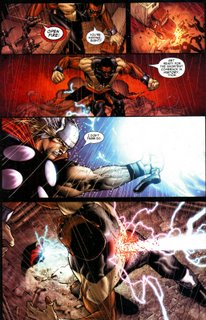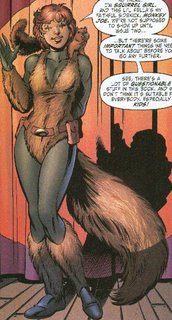
After a monthlong delay, the fourth issue of CIVIL WAR, Marvel's newest mega-crossover event, finally hit stands last Wednesday. This was of particular significance to me since, having enjoyed the first two issues but not so much the third, I'd decided that issue #4 would be the tipping point, the one that would decide whether or not I would continue. As it happened, said issue has also been the most controversial to date, which is saying something since- well, I'll be nice and put all the Spoilers under the cut.
For those who haven't followed, CIVIL WAR started with a superhero/supervillain fight that, through circumstances noone could foresee, ended up taking out an entire suburban block, including an elementary school. In the wake of the tragedy, the public rallied behind support of a bill that required all superhumans to register their powers and intent to fight crime with the federal government, which would then regulate superhero vigilanteism. This polarized the superhero community, with Iron Man leading the heroes in support of the bill and Captain America leading the ones in opposition. When the bill actually passed, the pro-Reg side was effectively in charge of finding and capturing the Anti-Registration heroes. This leads to punching.
 And so the focus of this issue was pretty much the punching. Thor showed up and dished out some serious punishment to the anti-Reg rebels, killing Goliath and smacking around many others. Only it wasn't Thor, it was a clone of Thor taken from his DNA, since the real Thor is still not around. Anyway, the shock over one of the heroes getting killed gave time for the rebels to escape and for the government types to regroup. Turns out the whole "Thor clone" project was known only to Tony Stark (Iron Man) and Reed Richards, and several people on their side are shocked by the revelation, including Sue Richards, who leaves her husband (and their children) in the hopes that this will jolt him out of his increasingly crazy "control the world with SCIENCE!" mindset. Meanwhile, another pro-Reg contingency plan is unveiled, as a group of supervillains are called in to help round up the rebels.
And so the focus of this issue was pretty much the punching. Thor showed up and dished out some serious punishment to the anti-Reg rebels, killing Goliath and smacking around many others. Only it wasn't Thor, it was a clone of Thor taken from his DNA, since the real Thor is still not around. Anyway, the shock over one of the heroes getting killed gave time for the rebels to escape and for the government types to regroup. Turns out the whole "Thor clone" project was known only to Tony Stark (Iron Man) and Reed Richards, and several people on their side are shocked by the revelation, including Sue Richards, who leaves her husband (and their children) in the hopes that this will jolt him out of his increasingly crazy "control the world with SCIENCE!" mindset. Meanwhile, another pro-Reg contingency plan is unveiled, as a group of supervillains are called in to help round up the rebels.So, what is my verdict? It's complicated. I viewed issue #4 as an improvement over the murky, muddy violence of last issue (hint to colorists: just because a scene takes place near flames doesn't mean EVERYTHING has to be tinted red. Hint to writers: maybe don't set so many fight scenes near Abandoned Flame Factories,) and it packs a good visceral punch, but there are problems too. Goliath is black (or rather was) and though he's technically not the FIRST to die, the incident still has that "expendable minority death" smell to it. At an early point, writer Mark Millar claimed that the series wouldn't be about "big deaths", which made me feel good after the carnage of INFINITE CRISIS. However, he's since clarified that he means he won't have deaths of major A-list characters who are sure to be brought back to life, so the B-list corpses can still pile up. Pooey.
There's some fandom disdain for the Thor-clone, possibly because the very word "clone" has acquired a negative connotation from the infamous Spider-Man Clone Saga, a classic trainwreck of continuity that manages to encapsulate so much of what was wrong with 90s comics. (Incidentally, the link leads to 35 long and confusing essays- it's worth reading, but clear some time on your schedule and some space in your brain.) Me, I don't mind that so much, as it's a very comic-book-y plot development and the real Thor is scheduled to be back shortly. A broader complaint is just how much of a jerk Iron Man/Tony Stark is being written as, and how the main conflict between him and Captain America has been sort of shoehorned in to Marvel Universe continuity, where previous attempts at "Superhero Registration" have been attempted, shot full of holes, and even opposed by folks like Reed Richards who are now taking the pro side. Comics continuity is a hard thing to maintain, and I think that generally it should be flexible with very little sweating-the-details (Hell, I want resurrections and retcons a-plenty if they're for things I like), but a lot of complaints seem to center on character motivation. Iron Man still has his own book, but his ruthless ends-justify-the-means approach in this series is making it harder for him to be a sympathetic hero. The bad things heroes do have a tendency to live on with them and tarnish their image; look no further than Hank Pym, who once hit his wife Janet while under the delusion that he was a supervillain and, though reformed many times, is now still referred to as a wife beater (and hasn't headlined his own book for quite some time.) Stark has some moments of reflection and regret in this issue, but Marvel's walking a very fine editorial line here.
The critical reception for CIVIL WAR might have been better if Millar, Quesada, etc. had not at some point made the claim that the book would take a balanced, evenhanded view of the whole "Superhero Registration" issue. If superheroes were real, there would indeed be many compelling arguments to having the government keep tabs on them and make sure they don't act as vigilantes. At the same time, we, the readers, as superhero fans, want the characters to continue to operate in the same legal gray area that they always do and to be bold individuals not fighting for the system but for the abstract cause of Justice. It's close to a key precept of the genre; there are some government-backed superheroes, but not that many, and even they don't spend time getting warrants. One can see how the issue might indeed be painted in an ambiguous way, but unfortunately, the actions of the pro-Registration side have continually conspired to paint them as fascist tools. They use unethical methods to achieve an end that may itself be ethical, but they've lost our sympathy already so it doesn't matter. So the complexities of the issue are lost in the carnage. (I come across as vaguely pro-Reg in this paragraph, but I'm also familiar with some good non-metatextual arguments against, so I remain ambivalent.)
It occurs to me I haven't gotten to any sort of point yet. Sorry about that. Basically, my opinion is that while I am enjoying the series and intend to finish it, I think it should have been set outside the actual Marvel continuity. It doesn't quite fit with what's happened in the past and how these characters have acted, and the ramifications for the future are, at best, messy. You've got the New Warriors, one of the increasingly rare "fun" teams, not only being killed off, but in such a way that they're currently remembered as blundering idiots who are partly responsible for the deaths of hundreds of children. This is the sort of thing that would have worked if it weren't the "real" New Warriors, or if Millar had been able to invent some totally original supers team whose sole purpose was to screw up and get some bystanders good and dead. (Alan Moore's legendary WATCHMEN, originally intended to feature a group of heroes DC had acquired from the defunct Charlton company, worked better when DC decided it might want to use those characters again afterwards and Moore created his own cast of heroes.)
One of the problems with the Big Annual Crossover Event is that, in addition to being a story, it has to "set up" events for other titles to play with and "alter the status quo" in some form or another, which often results in contrivances and digressions which only serve to make the main title read less elegantly. CIVIL WAR, on its own, is a fun enough diversion, well written, well drawn, with a couple of interesting points raised. However, I pity the poor bastards who will have to clean up after it.
And me? I'm with Squirrel Girl.

No comments:
Post a Comment